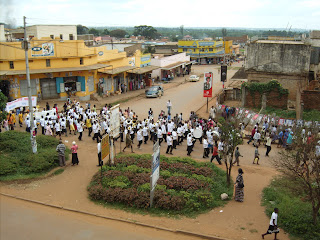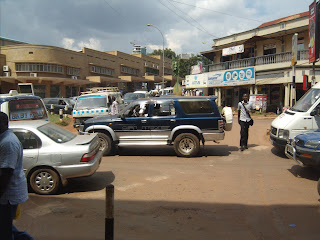Tree Planting and Climate Change
On Thursday I went to the official launch of the project for tree planting as part of the measures to address climate change. The project is part funded by Wales and so John Griffiths AM (Counsel General) was there to represent the First Minister, there were also lots of dignitaries and representatives of the tree planting groups from Uganda. The project has given a commitment to plant a million trees over the next years of the project. One of the things that has surprised me in hearing the discussions around this topic is how many examples the local farmers can give without any prompting that changes are occurring to the seasons and the climate on the equator. There used to be very clear and predictable wet and dry seasons. At the end of October we should be entering the dry seasons and it should quite hot and dry. Since I have been here it has rained every day to a greater or lesser extent. On Friday night I found it quite cold in bed because it had been cloudy for 2 days and so there had not been any sun to warm the ground and the air (although compared to back home its probably still very warm).
Listening to the presentations by the groups involved in the project I can now see the importance of planting trees (although I confess before I came to Uganda I could not really see the immediate relevance).
At the beginning of this year in the Bududa district (in the hills not far from here) there was a large landslide and there were many fatalities and loss of homes. This happened because people had relocated themselves and built their houses on the hillside and in doing so had removed quite large areas of forestation. It had been predicted that a landslide would occur but as ever no one really thinks it will happen to them. The displace families have been living in tents in a refugee camp since the landslide. The Ugandan Government are trying to relocate people to other less densely populated parts of Uganda but this is met with some resistance because the people to not have any support networks, family history or other links to these areas. It also doesn’t seem to be helped by the fact that they are relocated to the new area in a tent and provided with a small amount of money to start building a house. One of the discussions I overheard was that it would seem better for the Government to commence a building programme and provide basic housing in preparation for the relocation so that at least they have some kind of basic permanent structure with which to commence their new lives (also the tents they are providing to live in are not cheap tents so there is a double expenditure).
It was also reported that the mud slides are continuing to happen although on a much smaller scale and there had been 2 this week.
The Teacher/ Student group from Wales that visited this week visited the refugee camp and seemed to be stunned by what they found. The people at the camp said that they had not had any food for the past 3 days and they were not expecting to have any until abut 6 days. They has despatched whoever they could off to the neighbouring villages to try to get some food, and some had returned with rice and beans. However each of these is not much good without firewood, as the main method of cooking is a charcoal burner – and they did not have any firewood. Hence the need for the trees.
On another visit where there was an established tree planting project in the village, the locals reported that their crops of vegetable such as aubergines were doing very well as they were growing in the shade/ shelter of the trees. Without this shelter the sun is too fierce and the smaller plants just do not survive.
The main problem now for the locals growing crops is the unpredictability of the weather, they are finding it wet when it should be dry, the dry seasons are also longer leading some drought conditions. So the need for our combined efforts to address climate change is clearly much more urgent.
Nose and Feet
My nose has stopped running for the past two days although I still feel a bit under the weather. It’s only a cold but interestingly here it is most definitely ‘flu’. When talking to people no one talks about not feeling very well or anything like that – the language is very much 'are you sick’? People also turn up for work and say ‘I have malaria today’ and then disappear off to the health centre for medication. I was surprised to learn that the common course of treatment is tablets morning and evening for 3 days. I thought it would be for much longer.
My feet seem to have been a feast for something over the past 2 days and I am covered in bites which really really itch. I haven’t worked out yet if the DEET spray makes them itch more or whether there is something around that is not affected by the spray. When the weather is a warmer as it has been today it’s a nightmare to walk anywhere as the shoes/sandals rub the bites. I have got cream which helps a bit but I need to work this one out fairly quickly as I can’t do this for very long!
Experiences to make you think.
I had one of my first experiences that really shook me on Thursday evening. It was just about getting dark when a motorbike pulled up outside the health centre with 3 young men on the back. The one at the back got off and then I could clearly see that the one in the middle was supported by the body of one who was driving the bike. He was literally draped across his back with the side of his head resting on the nape of the driver’s neck. His nose was bleeding and he had quite bad facial injures. He also had a rough bandage on his left foot – both feet were just dangling as he was astride the motor bike. He was barely conscious and could not raise his head. The friends explained that he had come of a motorbike. The staff at the health centre explained that he required investigations that could not be provided here and they needed to go to the district hospital in Mbale. I could not understand the conversation and don’t know what was said but it seemed to take an eternity (about 15 – 20 minutes) before they could persuade the 3rd young man to get back on the bike to drive to Mbale. I asked whether the ambulance at Salem could be used to take him to the hospital, but the staff said this could only be done if he could pay for the petrol.
It wasn’t until much later that it occurred to me that I could have volunteered to pay for the petrol, it just didn’t think of it at the time and then felt quite guilty. The main thing is this is not just a single occurrence as these things happen every day here. It seems so hard to turn people away but they were absolutely right as he seemed to have serious inquires and they also don’t have the right drugs here for a head injury. We take so much for granted at home.
On a lighter note the group from Wales invited me to join them for dinner at the local hotel for their last night. It was a pleasant and there were people from PONT and the schools with which the Welsh schools are partnered. The minibus on the way back was the venue for some lusty singing of dubious quality. It was great. It was a very clear night last night and we stopped along the lane where it’s dark just before the entrance to the compound to have a look at the stars. This was one of the very few times that I have seen many many more stars than I can see at home. It made me want to learn them all or have an ‘app’ to recognise them – it really was stunning.
They have all gone home today – best wishes to any of them who might read this – we might meet again soon.
























